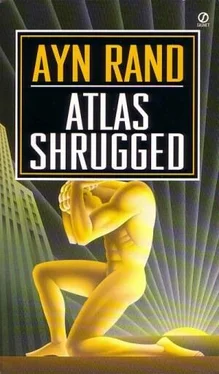Thompson say, "Don't you worry, Miss Taggart! We'll protect you from him!"
It had been easy to assume a look of cold shrewdness and to remind Mr. Thompson of the five-hundred-thousand-dollar reward, her voice clear and cutting, like the sound of an adding machine punching out the sum of a bill. She had seen an instant's pause in Mr. Thompson's facial muscles, then a brighter, broader smile—like a silent speech declaring that he had not expected it, but was delighted to know what made her tick and that it was the kind of ticking he understood.
"Of course, Miss Taggart! Certainly! That reward is yours—all yours!
The check will be sent to you, in full!"
It had been easy, because she had felt as if she were in some dreary non-world, where her words and actions were not facts any longer—not reflections of reality, but only distorted postures in one of those side-show mirrors that project deformity for the perception of beings whose consciousness is not to be treated as consciousness. Thin, single and hot, like the burning pressure of a wire within her, like a needle selecting her course, was her only concern: the thought of his safety. The rest was a blur of shapeless dissolution, half-acid, half fog.
But this—she thought with a shudder—was the state in which they lived, all those people whom she had never understood, this was the state they desired, this rubber reality, this task of pretending, distorting, deceiving, with the credulous stare of some Mr. Thompson's panic-bleary eyes as one's only purpose and reward. Those who desired this state—she wondered—did they want to live?
"The biggest stakes in the world, Miss Taggart?" Mr. Thompson was asking her anxiously. "What is it? What does he want?"
"Reality. This earth."
"I don't know quite what you mean, but . . . Look, Miss Taggart, if you think you can understand him, would you . . . would you try to speak to him once more?"
She felt as if she heard her own voice, many light-years away, crying that she would give her life to see him—but in this room, she heard the voice of a meaningless stranger saying coldly, "No, Mr.
Thompson, I wouldn't. I hope I'll never have to see him again."
"I know that you can't stand him, and I can't say I blame you, but couldn't you just try to—"
"I tried to reason with him, the night I found him. I heard nothing but insults in return. I think he resents me more than he'd resent anyone else. He won't forgive me the fact that it was I who trapped him.
I'd be the last person to whom he would surrender."
"Yeah . . . yeah, that's true. . . . Do you think he will ever surrender?"
The needle within her wavered for a moment, burning its oscillating way between two courses: should she say that he would not, and see them kill him?—should she say that he would, and see them hold onto their power till they destroyed the world?
"He will," she said firmly. "He'll give in, if you treat him right.
He's too ambitious to refuse power. Don't let him escape, but don't threaten him—or harm him. Fear won't work. He's impervious to fear."
"But what if . . . I mean, with the way things are collapsing . . . what if he holds out too long?"
"He won't. He's too practical for that. By the way, are you letting him hear any news about the state of the country?"
"Why . . . no."
"I would suggest that you let him have copies of your confidential reports. He'll see that it won't be long now."
"That's a good idea! A very good idea! . . . You know, Miss Taggart," he said suddenly, with the sound of some desperate clinging hi his voice, "I feel better whenever I talk to you. It's because I trust you. I don't trust anybody around me. But you—you're different.
You're solid."
She was looking unflinchingly straight at him. "Thank you, Mr.
Thompson," she said.
It had been easy, she thought—until she walked out into the street and noticed that under her coat, her blouse was sticking damply to her shoulder blades.
Were she able to feel—she thought as she walked through the concourse of the Terminal—she would know that the heavy indifference she now felt for her railroad was hatred. She could not get rid of the feeling that she was running nothing but freight trains: the passengers, to her, were not living or human. It seemed senseless to waste such enormous effort on preventing catastrophes, on protecting the mi safety of trains carrying nothing but inanimate objects. She looked at the faces in the Terminal: if he were to die, she thought, to be murdered by the rulers of their system, that these might continue to eat, sleep and travel—would she work to provide them with trains? If she were to scream for their help, would one of them rise to his defense?
Did they want him to live, they who had heard him?
The check for five hundred thousand dollars was delivered to her office, that afternoon; it was delivered with a bouquet of flowers from Mr. Thompson. She looked at the check and let it flutter down to her desk: it meant nothing and made her feel nothing, not even a suggestion of guilt. It was a scrap of paper, of no greater significance than the ones in the office wastebasket. Whether it could buy a diamond necklace or the city dump or the last of her food, made no difference. It would never be spent. It was not a token of value and nothing it purchased could be a value. But this—she thought—this inanimate indifference was the permanent state of the people around her, of men who had no purpose and no passion. This was the state of a non-valuing soul; those who chose it—she wondered—did they want to live?
The lights were out of order in the hall of the apartment house, when she came home that evening, numb with exhaustion—and she did not notice the envelope at her feet until she switched on the light in her foyer. It was a blank, sealed envelope that had been slipped under her door. She picked it up—and then, within a moment, she was laughing soundlessly, half-kneeling, half-sitting on the floor, not to move off that spot, not to do anything but stare at the note written by a hand she knew, the hand that had written its last message on the calendar above the city. The note said: Dagny: Sit tight. Watch them. When he'll need our help, call me at OR 6-5693.
F.
The newspapers of the following morning admonished the public not to believe the rumors that there was any trouble in the Southern states. The confidential reports, sent to Mr. Thompson, stated that armed fighting had broken out between Georgia and Alabama, for the possession of a factory manufacturing electrical equipment—a factory cut off by the fighting and by blasted railroad tracks from any source of raw materials.
"Have you read the confidential reports I sent you?" moaned Mr.
Thompson, that evening, facing Galt once more. He was accompanied by James Taggart, who had volunteered to meet the prisoner for the first time.
Galt sat on a straight-backed chair, his legs crossed, smoking a cigarette. He seemed erect and relaxed, together. They could not decipher the expression on his face, except that it showed no sign of apprehension.
"I have," he answered.
"There's not much time left," said Mr. Thompson.
"There isn't."
"Are you going to let such things go on?"
"Are you?"
"How can you be so sure you're right?" cried James Taggart; his voice was not loud, but it had the intensity of a cry. "How can you take it upon yourself, at a terrible time like this, to stick to your own ideas at the risk of destroying the whole world?"
"Whose ideas should I consider safer to follow?"
"How can you be sure you're right? How can you know? Nobody can be sure of his knowledge! Nobody! You're no better than anyone else!"
"Then why do you want me?"
"How can you gamble with other people's lives? How can you permit yourself such a selfish luxury as to hold out, when people need you?"
Читать дальше










